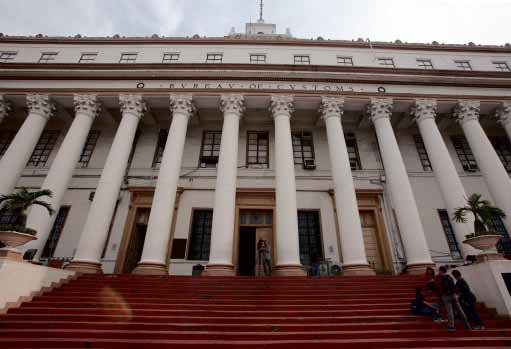
President Duterte intends to root out entrenched corruption at the Bureau of Customs by putting it under the management of the military. PHILIPPINE DAILY INQUIRER / JOAN BONDOC
President Rodrigo Duterte’s order to the military to temporarily take over the operations of the Bureau of Customs (BOC) is grounded on the Constitution, Malacañang said.
Presidential Spokesperson Salvador Panelo explained that as both Chief Executive and Commander-in-Chief of the Armed Forces, Duterte was “merely exercising his constitutionally mandated functions” when he issued the order to tame corruption at the bureau.
“Contrary to the claims of the usual critics of the administration, the President’s latest directive to the Armed Forces of the Philippines (AFP) to temporarily oversee the Bureau of Customs (BOC) is not just based on law but is also grounded on our Constitution,” Panelo said in a statement on Monday night.
“Ours is a civilian President who functions as both Chief Executive and Commander-in-Chief of the Armed Forces. In instructing men from the AFP to ensure that all laws are enforced within the Bureau of Customs, the President is merely exercising his constitutionally mandated functions,” he added.
Panelo issued the statement after some senators criticized Duterte’s latest directive.
READ: Pangilinan doubts legality of military control of Customs
Senator Francis “Kiko” Pangilinan raised doubts on the legality of the order. He also said that if Duterte “doesn’t show any teeth and outrage against big-time shabu smugglers and drug lords, nothing will come of AFP’s transfer because it will only follow Malacañang’s orders.”
For her part, Senator Risa Hontiveros called Duterte’s order as “backdoor dictatorship.”
READ: Hontiveros: Military control of BOC ‘unconstitutional, dictatorial’
Panelo, who is also Duterte’s chief legal counsel, stressed that the President’s order was in line with the 1987 Constitution’s mandate that “civilian authority is supreme over the military.”
“Indeed, the 1987 Constitution mandates that civilian authority is supreme over the military. With such mandate, our republic possesses a civilian leader who is also the head of the military. Accordingly, and as mentioned by the Supreme Court in Kulayan v. Tan, the President, who is also the Commander-in-Chief, is ‘authorized to direct the movements of the naval and military forces placed by law at his command, and to employ them in the manner he may deem most effectual’,” he said.
Panelo noted that as a lawyer, Duterte knows the limits of the power and authority of his office.
“Time and again, the President assures everyone that as a lawyer, he knows the limits of the power and authority of his office. Hence, our people can be assured that the directives by the President are well-studied, supported by the rule of law and, most importantly, intended solely for the benefit of our country,” he said. /cbb